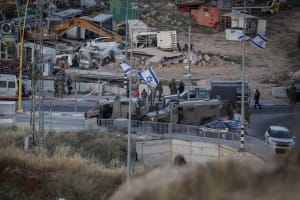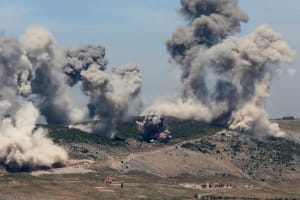Miraculous success: The opening moments of Israel's Six-Day War
Part 1 of a series looking back at that pivotal war in 1967

Few modern conflicts tend to evoke more controversy or fierce criticism than Israel’s Six-Day War, which occurred from June 5-10, 1967. Though 56 years have passed since the conflict, the outcome of the war continues to spark continued debate. There is no question that the immense tactical victories achieved in the war greatly helped to expand Israel’s territory.
However, more often, critics have been less likely to acknowledge that the territories acquired by the Israel Defense Forces victory still fell short of the amount of land agreed upon in the San Remo Resolution in 1920. Furthermore, it is essential to consider the factors that prompted the IDF to consider the risky, but brave first strike that prompted the commencement of that pivotal war.
By the early 1960s, tensions which had been simmering following the War of Independence and the Suez Crisis of 1956 had reached a boiling point. While the United States became entangled in the conflict in Vietnam, the Soviet Union seized the opportunity to provide military supplies to nations in the Middle East, including Egypt and Syria. The U.S. was unable to thwart Soviet action, as it was unable to commit troops or to become politically entangled in additional geopolitical conflicts.
At the behest of then-Israeli Prime Minister Levi Eshkol, then-U.S. President Lyndon B. Johnson agreed to provide monetary aid to support Israel. Eshkol, the first Israeli prime minister to visit the White House, gravely foreshadowed the significance of the forthcoming war when he told the U.S. president that Israel did not have the luxury of losing. Eshkol may have sensed that a potential war with neighboring Arab states could threaten Israel’s continued existence.
In May 1967, Egypt declared war on Israel and closed off its access to the Straits of Tiran. This was followed by the massing of Egyptian troops in the Sinai Peninsula near Israel’s border.
Rather than await the impending attack, on June 5, 1967, the Israeli Air Force opened the conflict with an unprecedented offensive air strike, which proved to be one of the most victorious air campaigns in military history.
Operation FOCUS (Moked in Hebrew) called for nearly 200 IAF combat aircraft to strike 18 Egyptian airfields and their aircraft on the ground. The plan was rehearsed for weeks in advance, so that at the time the operation began, the squadrons were able to fly the mission without any radio communication at altitudes of less than 50 feet.
While intense preparations for the IAF air strike made the pilots more than capable of completing their mission, at the same time a series of incredulous events confirmed that the operation was also divinely protected.
Egyptian radar equipment never identified the squadrons of IAF aircraft advancing towards their targets. While Jordanian radar identified a large number of aircraft advancing toward Egypt, warnings sent to Cairo were ignored due to the Jordanian general’s failure to utilize the correct password for communication with the Egyptian military. Furthermore, the air force and ground force commanders happened to be away from their posts due to family obligations.
In less than one hour, the IAF had destroyed over some 200 Egyptian aircraft, which accounted for more than half of the Egyptian Air Force. The operation was also responsible for the destruction of the Syrian and Jordanian air forces.
In just a matter of hours, the Israeli Air Force had not only achieved absolute air superiority, but also had turned the tide of a war that had barely begun. Not only was the aerial victory significant for its unrivaled mission success, but also because the IAF had existed for less than two decades.
The rapid aerial victories helped cultivate the opportunity for the Israel Defense Forces to decisively secure critical ground conquests. Israel’s victory spurred significant political and military advancements for Israel for decades to come and tripled the territory of the nation.

Though an educator for more than twenty years, following her return to school to earn a master’s degree in military history at Norwich University, Tara Simpson began working as a freelance writer for both the Stars and Stripes newspaper and ABC-CLIO reference publications. Inspired by her grandparents’ service in World War II and beyond, Tara has specialized in research and writing on early twentieth century military history for over a decade. She is now as a Doctoral student at Liberty University with her dissertation research focusing on Israel’s early and modern military history.













